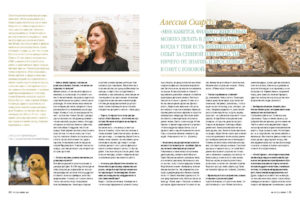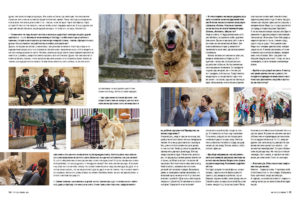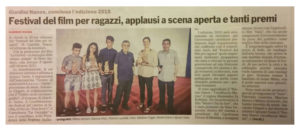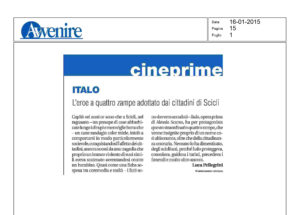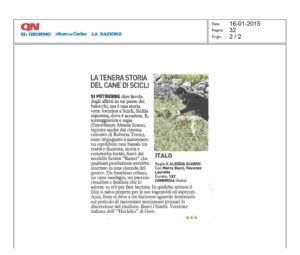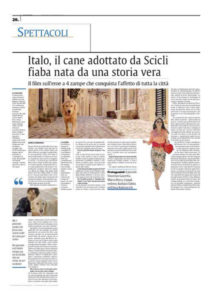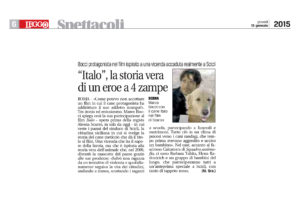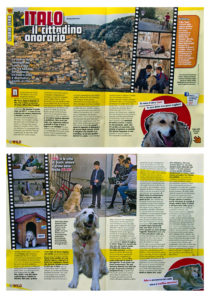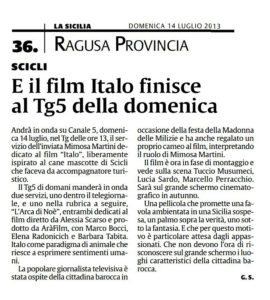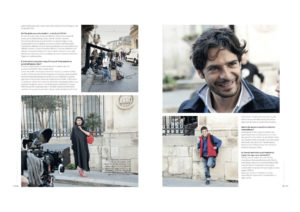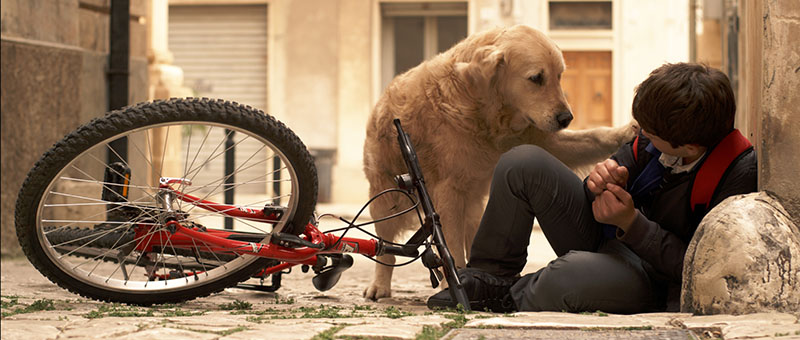
Based on a true story, Italo vividly depicts the life-altering friendship between an extraordinary dog and a lonely child. One day, a good natured stray dog by the name of Italo, wanders into the small Sicilian town of Scicli. But Italo’s arrival causes a terrible uproar in the village, everyone there is fiercely opposed to having stray dogs around. Everyone… except Meno.
Meno, a precociously wise 10 year-old, is as lonely and introverted as can be. Since his mother passed away he has shut everyone out, including his workaholic father. It will take all the unconditional love a special dog like Italo can give to force Meno out of his shell, leading him into a series of adventures that will teach him the difference between acting like a grown up and actually becoming one.
If ltalo had not existed, a film director would have had to invent him. As he really did exist, it was inevitable that he should star in a film. lt was a story waiting to be told. The film version of Italo’s story is not only about this extraordinary “character” but involves a multiplicity of intrigues in the lives of the inhabitants of a small town community all centred on ltalo. Our aim was to create a comedy which would also be moving and full of humanity. Besides ltalo, the other protagonists are three children and three adults portrayed against a Sicilian background full of colour and tradition.
In 2009, in the wake of an unfortunate incident involving a pack of stray dogs and a small child, the town of Scicli decided to round up all the strays and remove them from the streets. It was just at this time that this mongrel with a honey-coloured coat arrived in Scicli. Some people think he was left alone when his elderly owner died, others say he was abandoned by a vagabond. However, Italo never revealed his true story to anyone. Strangely, the psychotic fear of stray dogs began to lessen upon his arrival and obviously he could never have frightened anyone. He chose Via Mormina Penna in Scicli, Sicily, a UNESCO heritage site since 2002, as his new abode, because he was sure of finding food there opposite a pizzeria. He began to attend Mass in the Church of San Giovanni in the main square. The parish priest’s angry reaction, after all “Can we allow dogs in church?”, was to put up a notice outside saying “No dogs allowed.”. Italo, however, pretended that he couldn’t read and continued attending Mass. After a while, he learned the itineraries of the guided tours and he began to lead the tourists along the routes. He gained his enduring place in the collective imagination on the occasion of the funeral of a young man killed in a road accident. The night before the funeral he kept a vigil at the church door and on the following day, to everyone’s amazement, he headed the funeral cortège in front of the coffin.
Who was Italo? What was Italo? The people’s answer is that he was the reincarnation of someone who loved Scicli. He policed the UNESCO historic town centre, running after cars driving through the restricted transit zone and barking at them. On Sundays he attended Mass. He participated in funerals, weddings and religious festivities. He would greet the children as they came out of school and in an unforgettable unscheduled appearance during the “Festa della Madonna delle Milizie” (a historical re-enactment of the battle between the Normans led by Count Ruggero and the Saracens which took place in 1091) he made his entrance just as the Emir Belcane was scornfully addressing Count Ruggero as “Christian dog”. And he was centre stage. The following year the Mayor had to issue an order that Italo be kept on a leash during the festivities, in case he decided to give an encore.. “Cameras roll, action”. When a famous italian actor was filming a commercial in Scicli, he went on set every inch the consummate actor. He slipped through the corridors of Palazzo Spadaro and managed to wish happy 75th birthday to Piero Guccione, a very renowned contemporary artist born in Scicli. Pure fantasies? Every incident has been recorded, photographed filmed. Finally, a noblewoman donated 2000 euro to have the statuette made for the crib where Italo took his place last Christmas alongside the Ox, the Ass and Baby Jesus.
Italo departed this life on 31st January 2011, leaving a great void in the town.
“On the 15th March 2009, in the countryside near Scicli, in Sicily, a pack of stray dogs attacked and killed a young boy. In the same period and in the same town, a stray dog arrived, who made himself the darling of the whole community. The film is inspired by these two items of local news and by my encounter with Italo when we spent one summer aftertnoon together.
Sicily is well known as a land of contradictions, exposed to invasion by foreigners, who both conquered and enriched it. ITALO presents a picture of how Sicily confronts the issue of dealing with strangers from a novel perspective. It tells the story of how, once the barriers of prejudice and initial diffidence are overcome, it succeeds in accepting diversity. No matter if in this case the stranger is a loveable, benevolent stray dog.
It’s the story of a lonely, taciturn little boy and a very special dog, Carmelo, nicknamed Meno, and Italo. It not only chronicles the events in the life of a very singular dog who really existed, who attended Mass and guided tourists, but also a tale about growing up. Against this background the other characters, the inhabitants of the town, carry on their lives. Typical personalities who give a strong identity to the small community in which the story takes place like the mayor, the schoolteacher, the town councillor, the gossips, the old men who spend their days on a bench in the square, all personalities taken from the reality of everyday life whose idiosyncracies add colour and authenticity to the story.
Sicily has a reputation for guardedness, this film wants to show its sincerity, the witty authenticity of its people, mitigating through native humour its apparent contradictions and presenting them with an interweaving of realism and fantasy. The staging dwells on the 17t-century late Baroque architecture of the sets, on the hard stone of the grottoes in the natural quarries hollowed out by the centuries, and reveals the views and landscapes of the towns of Scicli and Modica, creating a fantastic fresco of the Sicily of today loved by UNESCO, while evoking in evident admiration the contemporary artists who have chosen to portray these places in their paintings.
An incredible true story, followed up, fictionalised and written with passion, which has inspired intense emotion in everyone who has read it, requiring an exceptional cast, something extremely rare if not unique for a first film, and I am especially proud that it features the very best acting talents that Sicily boasts of at the present time, as well as prestigious cameos like Piero Guccione, to name but one. A true story which aroused affection during the filming in the locations and also during the subsequent technical phases, captivating and winning over everyone who came to know about the course of events, almost as if they had actually met Italo himself.
The actions which involve both sets of characters, adults and children, are likewise connected to encounters with Italo. Each one of the characters will undergo change, especially Meno who will find, thanks to this fantastic stray dog, the key to how to grow up. Italo, however, will never belong to Meno, nor to anyone else. He belongs to everybody and nobody and, beloved of all, will leave behind him a greater lesson than he imparted by his presence.”
Alessia Scarso
| title | Italo |
| year | 2014 |
| duration | 104 minuti |
| country | Italia |
| producer | Arà Film |
| distributor | Notorious Pictures (Italy) |
| language | Italiano |
| subtitles | Inglese |
| shooting format | Redcam |
| screening format | DCP 2K / 24fps / 2.35 scope |
| sound | dolby 5.1 |
| color | colore |
| genre | comedy – biographic -family |
| director | Alessia Scarso |
| producer | Roberta Trovato |
| associate producer | Carmelo Scarso |
| with | Marco Bocci, Elena Radonicich, Barbara Tabita, Vincenzo Lauretta, Martina Antoci, Matteo Korreshi, Lucia Sardo, Andrea Tidona, Marcello Perracchio, Tuccio Musumeci |
| and the voice of | Leo Gullotta |
| storyline | Coralla Ciccolini, Alessia Scarso |
| screenplay | Coralla Ciccolini |
| script editor | Isabella Aguilar |
| DoP | Daria D’Antonio |
| editor | Alessia Scarso |
| composer | Marco Cascone |
| set designers | Giuseppe Busacca Maria Rosa Carpinteri |
| sound | Emanuele Cicconi |
| costume designer | Fiorenza Cipollone |
| make up | Valentina Iannuccilli |
| hairdresser | Roberta Mariani |
| first assistant | Alice Filippi |
| casting | Stefania Rodà |
| executive producer | Luca Emiliano Pancaldi |
| line producer | Ognjen Dizdarevic |
| availability | DCP / Bluray / Dvd |
| R2R International Film Festival for Youth | Vancouver (CANADA) |
| Taormina Film Festival | Taormina (ITALIA) |
| Minsk International Film festival Listapad | Minsk (BIELORUSSIA) |
| Kolkata International Film Festival FILM D’APERTURA |
Kolkata (INDIA) |
| Piccolo grande cinema | Milano (ITALIA) |
| Pantalla Pinamar Film Festival | Buenos Aires (ARGENTINA) |
| Sedona International Film Festival | Sedona (ARIZONA – U.S.A.) |
| Children’s Book Festival Monte Librić | Pula (CROAZIA) |
| Festival Europeo delle Scuole (MIGLIOR FILM) |
Guidonia (ITALIA) |
| Green Film Festival in Seoul | Seoul (COREA) |
| Italian Contemporary Film Festival Junior | Toronto (CANADA) |
| Festival delle Cerase | Palombara Sabina (ITALIA) |
| Shangai International Film Festival | Shanghai (CINA) |
| Tel Aviv International Children’s Film Festival | Tel Aviv (ISRAELE) |
| Magna Graecia Film Festival | Catanzaro (ITALIA) |
| Roseto Opera Prima (MIGLIOR SOGGETTO) |
Roseto degli Abruzzi (ITALIA) |
| N.I.C.E. New Italian Cinema Events | San Francisco, New York, Washington, Philadelphia (USA) |
| Sabaudia Film Fest | Sabaudia (ITALIA) |
| Bolsena Cinecastello | Bolsena (ITALIA) |
| Ariano International Film Festival (MIGLIOR FILM) |
Ariano Irpino (AV) |
| Festival del film per ragazzi (PREMIO NAXOS) |
Giardini Naxos (ITALIA) |
| Festival Felicità Italiana | Mosca (RUSSIA) |
| Lavazza Italian Film Festival | Melbourne (AUSTRALIA) |
| Italian Film Festival Cinema Italy | Miami (USA) |
| Bella Basilicata Film Festival | Bella (PZ, ITALIA) |
| Festival Internazionale Cinema e Donne | Firenze (ITALIA) |
| Costaiblea Film Festival | Ragusa (ITALIA) |
| Festival del Cinema a Como | Como (ITALIA) |
| N.I.C.E. New Italian Cinema Events | San Pietroburgo, Mosca (RUSSIA) |
| Italian Film Festival | SINGAPORE |
| Europe On Screen | Jakarta (INDONESIA) |
| Donnafugata Film Festival | Ragusa (ITALIA) |
| WIFTVMex Oficial | Città del Messico (MESSICO) |
| Italian Film Festival USA | Cleveland, Detroit, St. Louis, Chicago (USA) |
| Eurocine – Cine para Todos | COLOMBIA |
| 10 Netët e Kinemasë italiane | Tirana (ALBANIA) |
| Filsa2017 – Ciclo de Cine Europeo | Santiago del Cile (CILE) |
| Risita Italiana | Tlalpan (MESSICO) |



